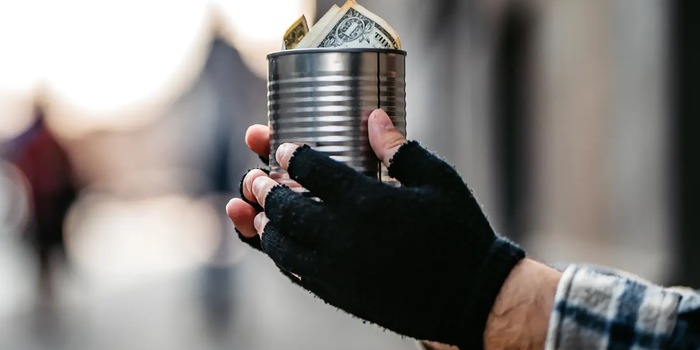
Suit wearers get more money
Poor people usually also look poor. This is even a disadvantage when begging, as a field experiment in New York and Chicago reveals.
Who would you give more money to help the homeless: a plain or a well-dressed man? Actually, you would expect a needy-looking person to be more willing to help. But the opposite is the case, report psychologist Bennett Callaghan from New York University and his colleagues from Columbia and Yale University in the scientific journal "Frontiers in Psychology".
Study author Callaghan is researching the causes of and possible solutions to social inequality at the Stone Centre for Socio-Economic Inequality. To this end, he himself appeared as a petitioner in the field experiment on the streets of New York and Chicago. On weekdays, he stood on the street and asked for a donation for the homeless with a paper cup and a sign. The bearded psychologist wore either plain dark jeans and a blue T-shirt or a dark suit with a white shirt and blue tie and his hair neatly styled with gel. In total, around 4500 people walked past him, and under both conditions not even every 50th person gave a small donation.
However, with a suit and tie, he received on average two and a half times as much money as in his modest wardrobe. Callaghan even received donations of five dollars or more exclusively in a suit, as the researchers report in a press release. According to the researchers, they donated the sum collected during the experiment to charity organisations for the homeless.
The surprising sight - a man in a suit collecting money for the homeless - was probably not the reason, they add. Because then it would have been expected that passers-by would have reacted in other ways, for example by saying something to him. But that didn't happen. Instead, a follow-up survey showed that the petitioner was judged differently depending on his clothing: He appeared more competent, more warm-hearted and even more human in a suit, and the interviewees felt more similar to this person.
The researchers explain that the perceived similarity creates more empathy. Status symbols such as clothing served as a sign of recognition: People who are comparatively wealthy themselves are more likely to recognise themselves in a person whose appearance suggests a similar status, and this promotes a willingness to help. Conversely, the presumed affiliation to a less privileged social class can set limits on the willingness to help.
Spectrum of science
We are partners of Spektrum der Wissenschaft and want to make well-founded information more accessible to you. Follow Spektrum der Wissenschaft if you like the articles.
[[small:]]
Cover picture: © urbazon / Getty Images / iStock (detail) If you want to ask for money on the street, you should make sure you are well dressed. (symbolic image)
Experts from science and research report on the latest findings in their fields – competent, authentic and comprehensible.